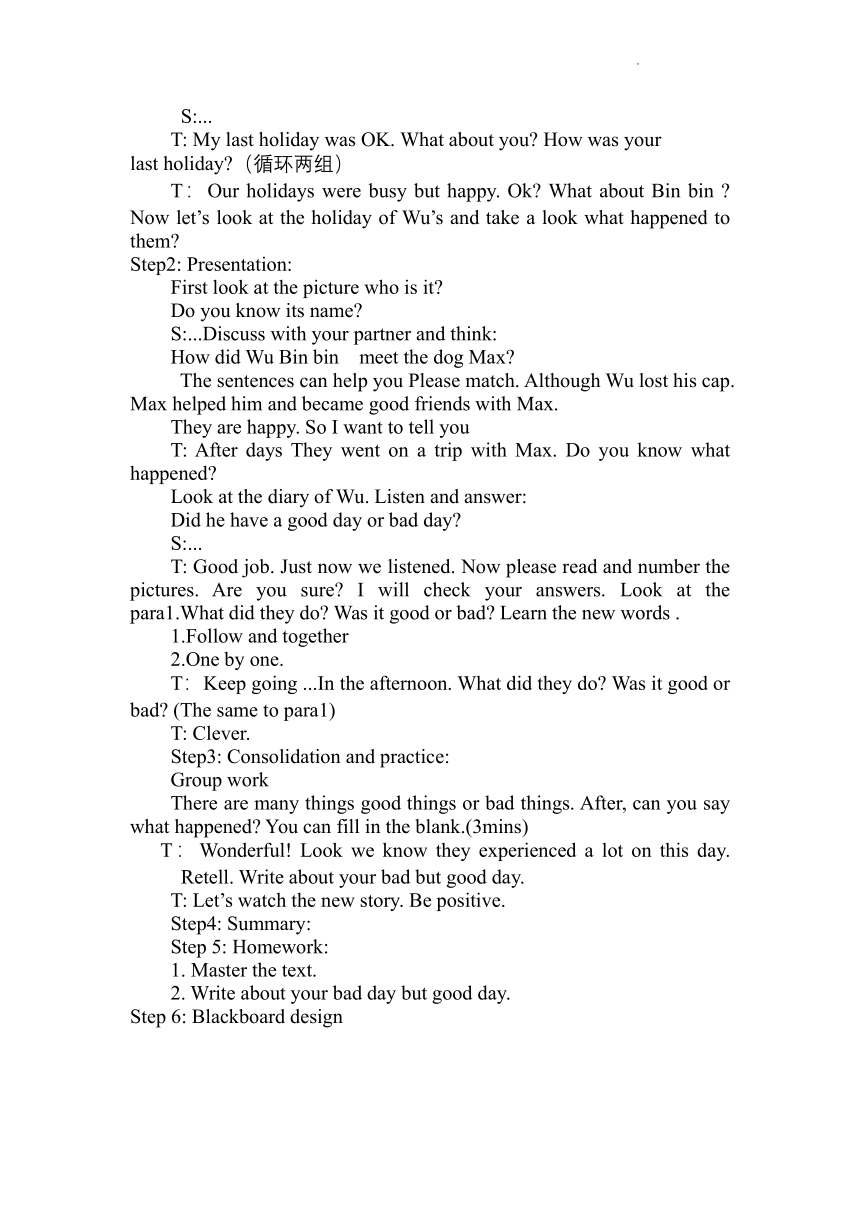Unit 3 Where did you go ?Part B read and write 教案(含教学反思)
文档属性
| 名称 | Unit 3 Where did you go ?Part B read and write 教案(含教学反思) |

|
|
| 格式 | zip | ||
| 文件大小 | 47.3KB | ||
| 资源类型 | 教案 | ||
| 版本资源 | 人教版(PEP) | ||
| 科目 | 英语 | ||
| 更新时间 | 2022-05-01 09:38:08 | ||
图片预览


文档简介
Unit 3 Where did you go Part B read and write教学设计
教材分析:
本册教材的四个新授单元集中呈现了两个方面的语言点:Unit 1 是比较级,Unit 3和 Unit 4 是过去式。六年级的学生,虽然属于小学高年级的学生,但仍不适合采用讲解语法的方式来教,建议将语言点的教学渗透在各种交际活动和任务型活动之中进行。
教材里大量复现了学生已经学过的词汇和语言,比如 Unit 1的词汇,形容词的原形都在五年级上册学习过;注重单元与单元内容之间的连贯衔接,比如 Unit 3谈论的是自己或他人在过去的时间里所做的事情,如 What did you do last weekend 第 4单元紧接着谈论的是询问别人在过去的时间里乘坐什么交通工具去了哪里?既巩固了过去时的用法,又复习了上册刚刚学过的有关交通方式的短语。
教学目标:
知识与能力:
1.能够正确听说认读单词和短语: basket, part, licked, laughed
2.能够听懂,读懂并内化Read and write 的内容,并能够通过阅读回答问题。
3.能够仿写教材中的日记,描述自己一天的活动。
过程与方法:
1.能以正确的语音语调朗读对话,并能理解课文大意。
2.能朗读课文,并利用所学技巧进行复述。
情感态度与价值:
养成乐观态度:Bad luck often brings good luck.
教学重点:
能够听懂,读懂并内化Read and write 的内容,并能够通过阅读回答问题。
教学难点:
能够仿写教材中的日记,描述自己一天的活动。
教学方法:
情景创设,自主学习
教学准备:PPT .Text-book .Word cards.
教学过程:
Step1: Warm up
Greeting:
T:Hello! Boys and girls. Welcome to my English class.......I can’t help enjoying a song with you Tell me about your holiday
T: What’s the song about
S:...
T: My last holiday was OK. What about you How was your
last holiday (循环两组)
T:Our holidays were busy but happy. Ok What about Bin bin Now let’s look at the holiday of Wu’s and take a look what happened to them
Step2: Presentation:
First look at the picture who is it
Do you know its name
S:...Discuss with your partner and think:
How did Wu Bin bin meet the dog Max
The sentences can help you Please match. Although Wu lost his cap. Max helped him and became good friends with Max.
They are happy. So I want to tell you
T: After days They went on a trip with Max. Do you know what happened
Look at the diary of Wu. Listen and answer:
Did he have a good day or bad day
S:...
T: Good job. Just now we listened. Now please read and number the pictures. Are you sure I will check your answers. Look at the para1.What did they do Was it good or bad Learn the new words .
1.Follow and together
2.One by one.
T:Keep going ...In the afternoon. What did they do Was it good or bad (The same to para1)
T: Clever.
Step3: Consolidation and practice:
Group work
There are many things good things or bad things. After, can you say what happened You can fill in the blank.(3mins)
T:Wonderful! Look we know they experienced a lot on this day. Retell. Write about your bad but good day.
T: Let’s watch the new story. Be positive.
Step4: Summary:
Step 5: Homework:
1. Master the text.
2. Write about your bad day but good day.
Step 6: Blackboard design
评测练习
1.Today was a bad but good day for me.
First, it was a bad day. ______________________ .
But what did I do then _____________________ .
So, it was also a good day. As the saying goes,
“Bad luck often brings good luck.”
2.Try to describe the story.
课后反思
小学英语重在真实自然,贴近学生的生活。教材中选用的单词和句式,一般都是社会中最常见,最基础的,但由于种种原因,有些学生还是不能很好的掌握他们的语音、音调。尤其是一些较难读的单词。其次,本堂课学生表现不是很积极,有些学生由于内向,孤僻的性格。他们不愿开口,不善交往;而开口少,与他人接触少,往往模仿能力也差。因此,他们缺乏自我表现的习惯和勇气。就连不得不参加的 “one by one”都是极低的声音,试图不引起别人的注意。具有这种性格倾向的学生,不仅学习上的困难无法解决,而且语言知识也不能达到最大限度的再现。在进行“pair work”时,他们总是不投入,缺乏跟同学的合作精神。在课后没有很好的语言环境,学生语音掌握更加困难。由于不知道英语的基本音标,有些学生面对已遗忘的单音节词不知所措,对他们来说,英语单词实在难记,这使英语课成了死记硬背的代名词。如果教师试图通过大量的练习来巩固学生所学的语言点,就会使教学“机械化”。使得一些学生对英语学习逐渐失去兴趣。因此对于此类学生我应该多关心,多沟通交流,引起他们学习英语的兴趣,让他们在生活中时时刻刻接触英语,就会避免这些弊端。
教材分析:
本册教材的四个新授单元集中呈现了两个方面的语言点:Unit 1 是比较级,Unit 3和 Unit 4 是过去式。六年级的学生,虽然属于小学高年级的学生,但仍不适合采用讲解语法的方式来教,建议将语言点的教学渗透在各种交际活动和任务型活动之中进行。
教材里大量复现了学生已经学过的词汇和语言,比如 Unit 1的词汇,形容词的原形都在五年级上册学习过;注重单元与单元内容之间的连贯衔接,比如 Unit 3谈论的是自己或他人在过去的时间里所做的事情,如 What did you do last weekend 第 4单元紧接着谈论的是询问别人在过去的时间里乘坐什么交通工具去了哪里?既巩固了过去时的用法,又复习了上册刚刚学过的有关交通方式的短语。
教学目标:
知识与能力:
1.能够正确听说认读单词和短语: basket, part, licked, laughed
2.能够听懂,读懂并内化Read and write 的内容,并能够通过阅读回答问题。
3.能够仿写教材中的日记,描述自己一天的活动。
过程与方法:
1.能以正确的语音语调朗读对话,并能理解课文大意。
2.能朗读课文,并利用所学技巧进行复述。
情感态度与价值:
养成乐观态度:Bad luck often brings good luck.
教学重点:
能够听懂,读懂并内化Read and write 的内容,并能够通过阅读回答问题。
教学难点:
能够仿写教材中的日记,描述自己一天的活动。
教学方法:
情景创设,自主学习
教学准备:PPT .Text-book .Word cards.
教学过程:
Step1: Warm up
Greeting:
T:Hello! Boys and girls. Welcome to my English class.......I can’t help enjoying a song with you Tell me about your holiday
T: What’s the song about
S:...
T: My last holiday was OK. What about you How was your
last holiday (循环两组)
T:Our holidays were busy but happy. Ok What about Bin bin Now let’s look at the holiday of Wu’s and take a look what happened to them
Step2: Presentation:
First look at the picture who is it
Do you know its name
S:...Discuss with your partner and think:
How did Wu Bin bin meet the dog Max
The sentences can help you Please match. Although Wu lost his cap. Max helped him and became good friends with Max.
They are happy. So I want to tell you
T: After days They went on a trip with Max. Do you know what happened
Look at the diary of Wu. Listen and answer:
Did he have a good day or bad day
S:...
T: Good job. Just now we listened. Now please read and number the pictures. Are you sure I will check your answers. Look at the para1.What did they do Was it good or bad Learn the new words .
1.Follow and together
2.One by one.
T:Keep going ...In the afternoon. What did they do Was it good or bad (The same to para1)
T: Clever.
Step3: Consolidation and practice:
Group work
There are many things good things or bad things. After, can you say what happened You can fill in the blank.(3mins)
T:Wonderful! Look we know they experienced a lot on this day. Retell. Write about your bad but good day.
T: Let’s watch the new story. Be positive.
Step4: Summary:
Step 5: Homework:
1. Master the text.
2. Write about your bad day but good day.
Step 6: Blackboard design
评测练习
1.Today was a bad but good day for me.
First, it was a bad day. ______________________ .
But what did I do then _____________________ .
So, it was also a good day. As the saying goes,
“Bad luck often brings good luck.”
2.Try to describe the story.
课后反思
小学英语重在真实自然,贴近学生的生活。教材中选用的单词和句式,一般都是社会中最常见,最基础的,但由于种种原因,有些学生还是不能很好的掌握他们的语音、音调。尤其是一些较难读的单词。其次,本堂课学生表现不是很积极,有些学生由于内向,孤僻的性格。他们不愿开口,不善交往;而开口少,与他人接触少,往往模仿能力也差。因此,他们缺乏自我表现的习惯和勇气。就连不得不参加的 “one by one”都是极低的声音,试图不引起别人的注意。具有这种性格倾向的学生,不仅学习上的困难无法解决,而且语言知识也不能达到最大限度的再现。在进行“pair work”时,他们总是不投入,缺乏跟同学的合作精神。在课后没有很好的语言环境,学生语音掌握更加困难。由于不知道英语的基本音标,有些学生面对已遗忘的单音节词不知所措,对他们来说,英语单词实在难记,这使英语课成了死记硬背的代名词。如果教师试图通过大量的练习来巩固学生所学的语言点,就会使教学“机械化”。使得一些学生对英语学习逐渐失去兴趣。因此对于此类学生我应该多关心,多沟通交流,引起他们学习英语的兴趣,让他们在生活中时时刻刻接触英语,就会避免这些弊端。
